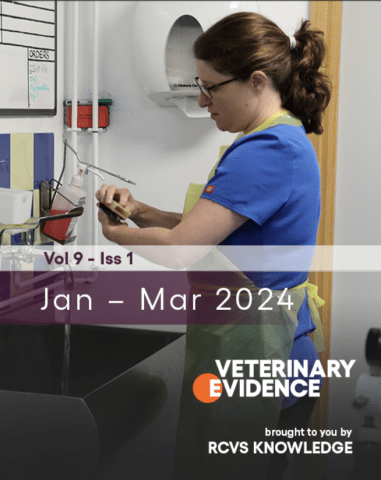Get access to all handy features included in the IVIS website
- Get unlimited access to books, proceedings and journals.
- Get access to a global catalogue of meetings, on-site and online courses, webinars and educational videos.
- Bookmark your favorite articles in My Library for future reading.
- Save future meetings and courses in My Calendar and My e-Learning.
- Ask authors questions and read what others have to say.
Evaluating the effect of equine tetanus antitoxin on mortality rates of dogs affected by tetanus
Wong B.
Get access to all handy features included in the IVIS website
- Get unlimited access to books, proceedings and journals.
- Get access to a global catalogue of meetings, on-site and online courses, webinars and educational videos.
- Bookmark your favorite articles in My Library for future reading.
- Save future meetings and courses in My Calendar and My e-Learning.
- Ask authors questions and read what others have to say.
Read
In dogs with tetanus, does administering the equine tetanus antitoxin compared to not administering the antitoxin reduce mortality rates?
Appraisal, application and reflection
Three studies were reviewed for this Knowledge Summary, all of which were retrospective case-control studies that aimed to evaluate the clinical courses and outcomes of dogs affected by tetanus. The main finding reported was that there was no positive or negative effect on the survival of dogs affected by tetanus who received the equine tetanus antitoxin (Bandt et al., 2007; Burkitt et al., 2007; and Zitzl et al., 2022).
There were an insufficient number of cases in the studies reviewed, as demonstrated by the relatively small sample sizes. Two of the studies appraised are relatively old being published at least 15 years ago, and therefore advances in intensive care management and general nursing care since would play a part in affecting the mortality rate of dogs affected by tetanus, questioning the applicability of these studies’ findings. Furthermore, referral populations were assessed and therefore findings may not necessarily represent those found with other subpopulations. Variable treatment protocols for each case associated with the retrospective nature of the studies is a large confounding factor but this was acknowledged in their respective discussions. Given the broad aim of the studies, direct comparison of outcomes on the basis of clinical treatment choice, or specifically on the basis of administration of the antitoxin in this case, was not always clear to avoid confounding by indication as mentioned in Burkitt et al. (2007). In other words, an accurate and reliable association between the use of the equine tetanus antitoxin and mortality rates cannot be deduced based on these retrospective studies owing to the fact that more severely affected dogs were potentially more likely to receive earlier, higher frequency of treatments and interventions. As a result, alternative associations between the multiple different treatments and interventions used, as well as the indications of their use and the mortality rates of the dogs affected by tetanus, cannot be ruled out.
Cases of tetanus in dogs are relatively uncommon. The small sample sizes of the studies reviewed may be explained by the fact that dogs are relatively resistant to tetanus due to poor tetanospasmin penetration of neural tissue compared to that in humans (Greene, 2006). Moreover, the antitoxin acts by binding to any unbound toxin. Considering this, its administration would likely be useful during the peracute stage of the disease which may well be prior to presentation. Future large, randomised, prospective studies assessing for optimal timing and dosing of equine tetanus antitoxin administration, complication rates, and duration of hospitalisation or time to recovery in survivors are indicated to determine whether the findings of these three studies reviewed are supported or refuted.
Get access to all handy features included in the IVIS website
- Get unlimited access to books, proceedings and journals.
- Get access to a global catalogue of meetings, on-site and online courses, webinars and educational videos.
- Bookmark your favorite articles in My Library for future reading.
- Save future meetings and courses in My Calendar and My e-Learning.
- Ask authors questions and read what others have to say.
About
Affiliation of the authors at the time of publication
University of Bristol School of Veterinary Sciences, Langford Vets, Langford, Bristol BS40 5DU
* Corresponding author email: [email protected]
Copyright Statement
© All text and images in this publication are copyright protected and cannot be reproduced or copied in any way.Related Content
Readers also viewed these publications
Subscribe
Veterinary Evidence is an online, open access, peer-reviewed journal owned and published by RCVS Knowledge. If you would like to receive updates on recent publications, you can register here. If you would like to submit an manuscript for publication in the Veterinary Evidence journal, you can consult the Guidelines for Authors.


Comments (0)
Ask the author
0 comments